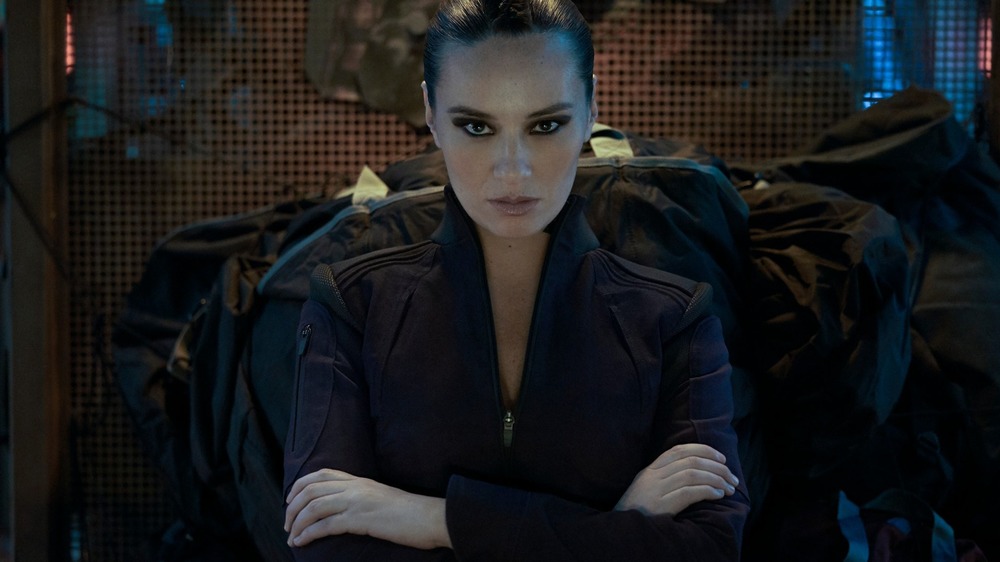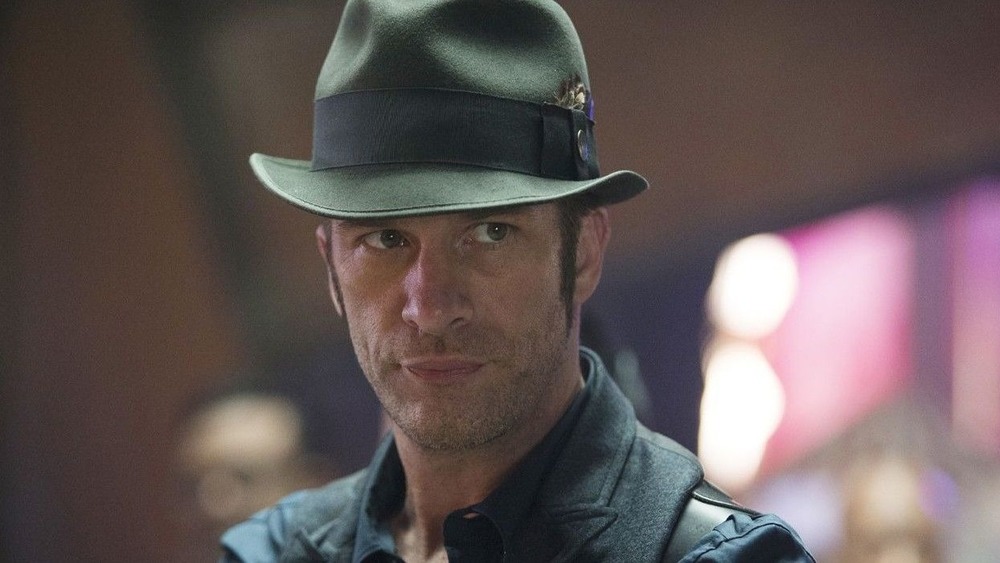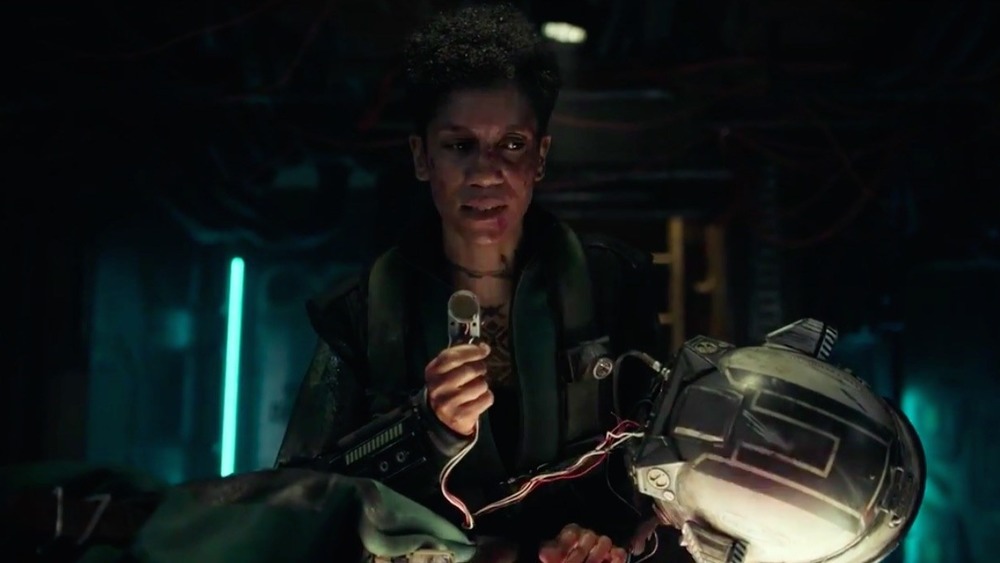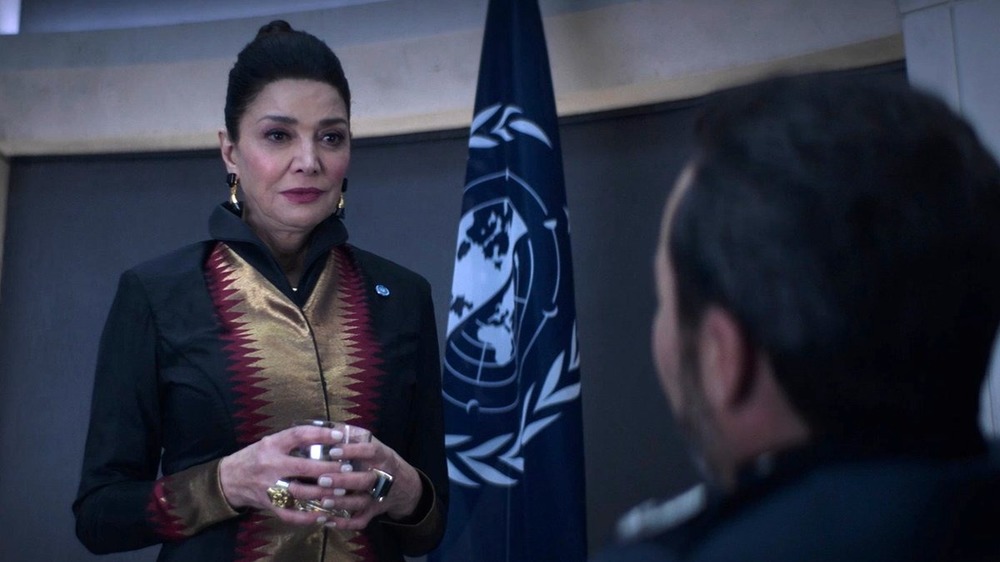The Expanse's Daniel Abraham Spills On The Hit Amazon Show - Exclusive Interview
Aside from his co-author Ty Franck, nobody knows more about The Expanse than Daniel Abraham. Writing under the pen name James S. A. Corey, Abraham and Franck published the first book in The Expanse saga, Leviathan Wakes, in 2011. Critical acclaim, a handful of awards, eight more novel-length installments, and a number of novellas and short stories followed.
But that was only the beginning of The Expanse's journey. In 2015, Syfy brought the story, which details an ongoing power struggle between Earth, its former colony on Mars, and the exploited laborers in the asteroid belt between Jupiter and Mars, to the screen. While it hasn't been completely smooth sailing for the series — Syfy canceled The Expanse after its third season finale, only for Amazon Prime to pick it up for another three seasons — the reaction to the show mirrors that of the books. For many sci-fi fans, there's no better show on television.
And, remarkably, Abraham has been there every step of the way. Not only are he and Franck still working on the prose series, which ends in October 2021 with Leviathan Rises, but they're fixtures in the TV show's writer's room, too (they also serve as executive producers). As such, there's no one better to ask about all things The Expanse — which is exactly what we did. In our talk, Abraham gives us the nitty-gritty on The Expanse's gaming origins, the challenges that come with adapting one's own work for a different medium, and what the future of The Expanse has in store.
What it was like adapting The Expanse for television
So, rumor has it that The Expanse started as a setting for a tabletop role-playing game. Is that true?
How I came into it was a homebrew RPG by [co-author] Ty Franck. Originally, he built it as a pitch for an MMO. And you can still kind of see some of the bones of that in there because it was back in the days when World of Warcraft ruled the earth. And World of Warcraft had two factions, so he had three. The pitch never went any place. The people he was talking to figured out how much an MMO costs to actually get off its feet, avoided eye contact, and walked away.
But after that, he explored the setting. He did a play-by-post for a while on a message board he was on. And when he moved to New Mexico, he had an instance of it running up in Santa Fe with a bunch of the writers up there. I had a kid, I couldn't go up to Santa Fe. It's an hour north of where I am. I couldn't do that to play. So he very kindly put together a version of the game to play in Albuquerque with me and him and our wives.
My character in that game was Detective Miller. That was my intro to the thing. You know, we didn't actually play that many times. We played maybe three or four times, and I was like, "Dude, you've done all of this work. You've done all of the background. You've done all of the research. You know everything about this. We should write this as a book." And he said, "Sure, okay." And then we did, and then things just kind of snowballed from there. Who knows? It was wild.
You're an author who's also directly involved in the TV adaptation of his work, which is unusual. Given that, who was the hardest character for you guys to cast?
That's such a complicated question. There are so many things that go into casting. I'll give you this one. It wasn't the hardest to cast, but it was the one where there were so many people who made it clear it was going to be hard to cast.
Okay, I'll give you two. One of them was Amos, because Amos is a really easy character to misunderstand. He, especially in the first season, looks like the generic tough guy. And we had a bunch of people who auditioned for it who were playing generic tough guy. And Wes [Chatham] had actually read the novella that has Amos' backstory, and loved character, and understood the character coming in. Everybody else was coming in and looking gruff and mean and looking for a fight. Wes was just coming in and going, "Yep. Ejecting you too." It was perfect.
The hardest one to cast was Bobbie, getting Frankie Adams, because it was really important to us not to blink on keeping the ethnicity and background of the character true to the books. And there's just not a lot of folks like her in people's Rolodexes. We had to set up places in a bunch of places. Again, it wasn't just L.A., New York, see who you get. We had to go to Hawaii, and we had to go to New Zealand, we had to really push to get the right people to read for it. And then she came and read for it, and then it was easy. But it still was hard.
You're telling this story for the second time. Is there anything that you feel like you improved on in the show, or that you were happy to get a second chance to try?
There were a bunch of things that the retelling allowed that were fascinating. I mean, the thing that really stuck out to me was in the second season, when we got to include Paolo Cortázar, who's from a novella called The Vital Abyss, and doesn't really come into his own in the series until pretty late in the game. We've gotten to get him in early, and we got to have his experience with psychosurgery and having his conscience physically removed. Amos and his rather odd psychology and background talk to each other a little bit in the plot in a way that was really... I mean, I think those two characters have a lot to say to each other, and they just didn't wind up in the same place at the same time in the books. So that wasn't an option for us. Getting to see that play out was great.
Is there a moment or scene from the books that you wish had made it into the show, but that you didn't get to do?
There's one image from the end of Cibola Burn where they're evacuating a ship using blister airlocks. They're put together into bubbles. I think that's a beautiful image. I'm not sure it's a producible image. But, I mean, that's one of the nice things about writing books. You don't have a budget.
What you can expect from The Expanse season six
The Belters' accent is one of my favorite parts of the show. It's so unique. Do you have any insight into what went into developing that?
Oh, yeah, we hired a linguist. What we did was, we've got a guy named Nick Farmer, who's a polyglot and a linguist, and he built this whole vocabulary and grammar and talked about how the words and language and vocabulary we have now would change and shift. It's one of the most scientifically accurate parts of the show, actually, the building of that Creole. What we did in the books was much less rigorous. As for accuracy, the show is way better on that than the books are.
We know that Cas Anvar isn't coming back for the final season. Are you planning to recast, or will there be a narrative reason why he's not there?
So, here's the thing I loved about Babylon 5, right? Babylon 5 was a great show, and it was really the basis, I think, for a lot of long-form television. And one of the things that J. Michael Straczynski was brilliant about and that I really appreciate, and you can see it play out in his work, is every character, the whole way through, is standing on a trap door. It's just smart. It's just a smart way to do it.
Okay. That makes sense. And that's one thing I think your show does really well is that there's always more jeopardy. Things are always getting worse.
Well, and bigger.
And bigger.
Yeah. That's the game right there.
You have one more season coming up, but there's more than one more book left to adapt. Is the show still going to stick to the spine of the novels, or are you guys going to be making big adjustments to set up the finale?
There is a place at the end of book six that makes a very emotionally complete, satisfying story. Doesn't end every arc. There's still the possibility for more stuff later because all of history doesn't end. But for folks who have read the books, you kind of know where we're stepping off. There's a very natural and appropriate stepping off place.
The show's been revived once. Are you shopping it around? Are there discussions about bringing it back again?
I'm not shopping it around. I don't own the rights. I think, if there is an interest and a hunger for the rest of the story to come out in some other format, I would be happy to help out on that.
What Daniel Abraham has learned from his time working on The Expanse
You've also done a lot of work with George R.R. Martin. As a writer, what have you learned from him?
From George? George was one of my very first teachers. I started working with him when I went to the Clarion West Workshop in 1998. He gets a lot of focus for Game of Thrones, but he's also one of the best short story writers that the genre has created. His short fiction, I think, is underappreciated. And that was where I came in. He was very kind in editing my short stories when I was in the workshop with him and was very supportive of my career and my work.
I mean, what I learned from him, specifically, is the ways that his brain works that my mind doesn't. His work has always been, especially his longer work, very much like a historian coming in and creating this different world and really populating it densely and understanding all of the things. I'm much more of a theatrical writer. I'm much more putting on a stage play. And that's just a difference in approach and aesthetic. I mean, he also taught me a great deal about how you structure a story and how you work a paragraph and how you make an interesting sentence. He got me when I was learning and malleable.
Is there anything that you haven't been asked about, or that you've never gotten to say about this show or the novels, that you'd like to? Or something that you want to call attention to that you think is underappreciated?
I think Ty and I get a lot of credit because we wrote the books, and we've been in the writers' room, and so we stand out as oddity. The thing that I would point to is the continuity we've had across all of these seasons with Naren Shankar, who is the best manager I have worked with in any industry, and a tremendous creative force of his own. Dan Nowak is the other writer who has been there since season one and is going through the end of season six. Naren and Dan deserve a lot of credit for what this is and how this happened. And I think that sometimes Ty and I, because of the book thing, overshadow the team a little bit. It's an amazing team. And Ty and I could not have done this. This is not a Daniel and Ty gig. That's just the books.
But you are in the writers' room, right?
Oh, we're absolutely in the room. It's just... we're not the room. We came in learning how to make a TV show and learning how to write a screenplay, which is totally not like writing a book. It's a completely different process. And it was hard. It was a terrible learning curve, because all of the things that make a book really good make a script really terrible. I went in there writing like I was writing short stories. It doesn't work at all.
And we had folks like Dan who's a really experienced screenwriter, and Naren who was very, very kind in getting feedback and iterating editing notes. Ty learned faster than I did. But helping us understand what this process was and how to engage with it in a way that was useful, to a way that I feel educated now in a way that I just wasn't when we started this.
Has the stuff you learned working on the show gone on to inform how you've written the later books?
The thing that has informed my process most from this is watching Naren care about minutiae, watching him go through and spend the time in color correction, and spend the time in the sound mix, and do all of these tiny, almost invisible little things that improve the show, maybe 1%, maybe 2%. And then they accrete over the process of making it to a thing that's just amazing to watch. So he has made me more aware of how important it is for me to pay attention to the sentences, and the paragraph brick, and the sounds of the words, and all of the minutiae in the writing. It's a translation, it's not the same thing, but it's an aesthetic and a dedication to the process. So he's made me more aware and self-conscious of the places that maybe I was slacking off a little bit that maybe I shouldn't slack off.



